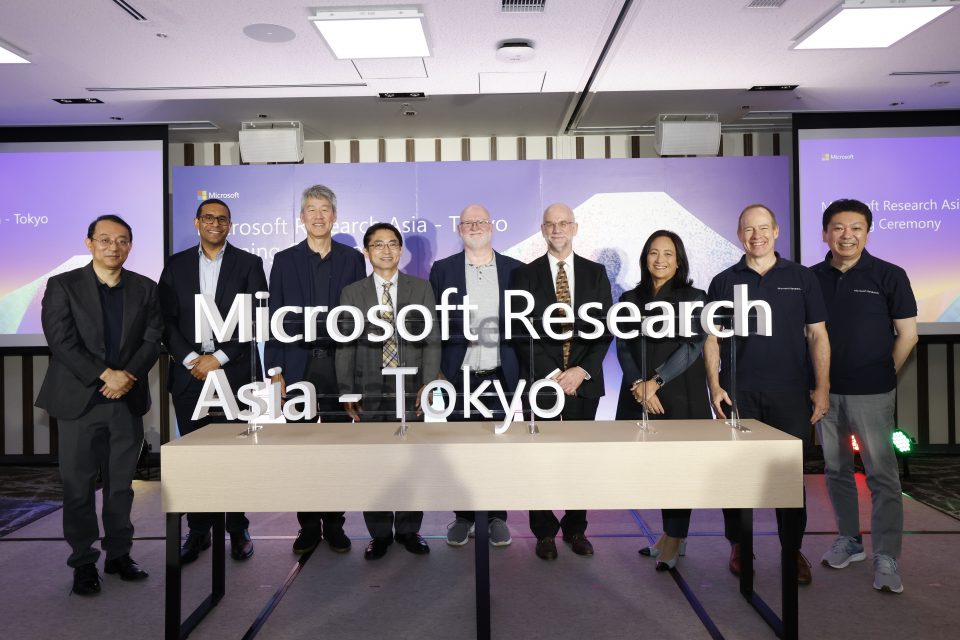Tokyo, Japan — Nov. 18, 2024 – Microsoft announced the opening of Microsoft Research Asia – Tokyo, reinforcing its commitment to advancing AI research and innovation across the Asia-Pacific region. This strategic expansion marks a significant step in the company’s mission to advance science and technology for the benefit of humanity.
Purpose and vision
The Tokyo lab will focus on critical areas that reflect Japan’s socioeconomic priorities, including embodied AI, well-being and neuroscience, societal AI, and industry innovation. These research efforts aim to leverage advanced technologies to foster societal progress and contribute to the region’s innovation ecosystem.
“For centuries, Japan has fostered an incredible heritage of innovation and craftsmanship, which has supported an equally strong culture of engineering and research,” said Microsoft Chief Technology Officer Kevin Scott. “We’re honored and delighted to have a research lab in Tokyo that can continue in this long Japanese tradition. The establishment of Microsoft Research Asia – Tokyo represents a significant milestone in our commitment to advancing frontier research and innovation in AI. This lab will play a crucial role in driving impactful advances in areas such as societal AI and embodied AI, addressing critical regional challenges, and contributing to the broader global technological landscape.”
Yasuyuki Matsushita, the head of the Tokyo lab, expressed his enthusiasm for this new chapter. “With the rapid evolution of AI, there are immense opportunities to make meaningful contributions both locally and globally. Tokyo is a hub of technological innovation and collaboration. Our Tokyo lab will tap into the rich talent pool and diverse perspectives that Japan has to offer, bringing together the brightest minds in academia and industry to drive innovative solutions.”
“The establishment of the lab in Tokyo is an important milestone in Microsoft Research’s global expansion and our long-standing collaboration with Japan, which began in 2005 with the Mt. Fuji program. Over the years, Microsoft Research Asia has forged deep and meaningful connections with Japan’s academic and innovation communities, driving research collaboration, fostering talent, and promoting academic exchange,” said Lidong Zhou, corporate vice president and managing director of Microsoft Research Asia. “We’re excited to build on this foundation and look forward to further advancing innovation together in this dynamic and globally influential ecosystem.”
Research focus and initiatives
At the Tokyo lab, Microsoft Research Asia aims to cultivate an innovative environment that empowers researchers to push the boundaries of technology. Research initiatives will include:
- Embodied AI: Developing intelligent systems that can perform complex tasks and understand and interact in physical and virtual environments.
- Societal AI: Exploring the implications of AI on society, ensuring that technology serves humanity’s best interests.
- Well-being and neuroscience: Drawing inspiration from neuroscience to re-imagine human-AI interfaces, applying AI to enhance well-being.
- Industry innovation: Embracing interdisciplinary and cross-boundary research to understand real-world needs, empowering industry transformation in collaboration with industry partners.
The establishment of the Tokyo lab will enhance Microsoft Research Asia’s ability to forge deeper collaborations with local partners, enabling cross-cultural and interdisciplinary exchanges that promote technological advancements.
Commitment to talent development
Central to Microsoft Research Asia’s mission is the nurturing of talent and fostering the next generation of innovators. The Tokyo lab will implement various talent programs, including joint research initiatives, internship opportunities, and visiting scholar programs. These initiatives aim to equip early career professionals with hands-on experience and essential skills to tackle complex technological challenges.
“We’re looking for curious, self-driven individuals who are passionate about solving societal issues,” adds Matsushita. “Our commitment is to create a supportive environment where talent can thrive and contribute to global technological progress.”
A bright future for AI research
The opening of the Tokyo lab signifies Microsoft Research Asia’s ongoing dedication to leading AI research in the Asia-Pacific region. By expanding our footprint in Japan, the company aims to strengthen its collaborative efforts and leverage the rich technological landscape of the country. As it embarks on this exciting journey, the company is committed to sharing its research outcomes openly, ensuring its work benefits the broader industry and enriches the global knowledge pool.
Miki Tsusaka, corporate vice president of Microsoft Japan, said, “The establishment of Microsoft Research Asia – Tokyo marks a significant step forward in contributing to the revitalization of the Japanese economy through science. As a research hub focusing on AI innovation, we have high expectations for its role in addressing Japan’s unique societal challenges. Microsoft Japan will continue to support the development of Japanese society through collaboration with this lab, in addition to our investments in domestic datacenters and reskilling initiatives.”
***
For more information on the Tokyo lab and opportunities to collaborate, visit http://approjects.co.za/?big=en-us/research/lab/microsoft-research-asia/







